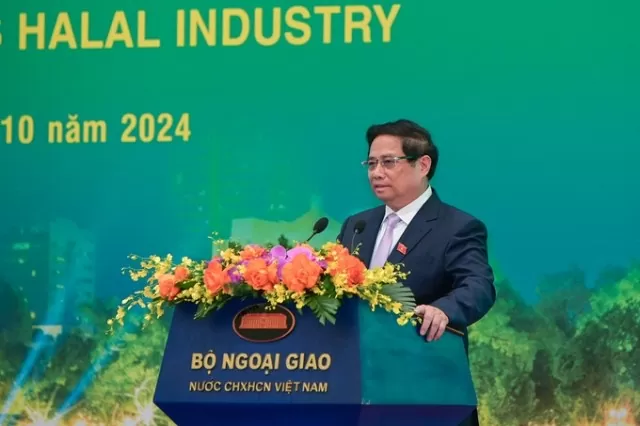
Positioning Vietnam’s Halal Industry: Insights From Diplomats
Latest
 |
| Positioning Vietnam’s Halal Industry: Insights From Diplomats |
In talking with the World and Vietnam Report, former Vietnamese Ambassador to Austria and former Director-General of the Middle East and Africa Department Nguyen Trung Kien; and Vietnamese Ambassador to Malaysia Dinh Ngoc Linh analyzed the barriers and challenges facing Vietnam’s Halal industry. They also discussed the current position of Vietnam in the Halal market and what needs to be done to achieve a breakthrough.
Challenges ahead
From the perspective of Vietnam’s diplomatic missions, former Ambassador Nguyen Trung Kien emphasized that the biggest challenge in promoting the Halal industry lies in limited resources. This is especially significant as these missions must juggle multiple diplomatic responsibilities, necessitating prioritization.
However, Mr. Kien noted that each diplomatic mission can contribute to the Halal campaign in its unique way. For instance, the Vietnamese Embassy in Malaysia can act as a bridge connecting Halal certification centers and Vietnam's Halal market development agencies with their Malaysian counterparts.
Or the Vietnamese Embassy in Austria can assist Vietnamese businesses and Halal specialists in accessing the European market, engaging with European quality control agencies, and tapping into Europe’s Halal ecosystem. Additionally, the êmbassy can liaise with UN agencies based in Vienna, such as the United Nations Industrial Development Organization (UNIDO), to facilitate the harmonization of Halal standards and enhance the capacity of Vietnam's Halal certification centers.
"For overseas diplomatic missions, our task now is not just to tell the story of our desire to develop the Halal industry but to take concrete actions," said Mr. Nguyen Trung Kien. "We must roll up our sleeves, involve relevant organizations, and negotiate with them to create mutually beneficial outcomes.
The scope of our economic diplomacy today is highly diverse and extremely urgent. Therefore, we need to carefully select the tasks, timing, and partners to achieve the highest efficiency."
Drawing from the experience of Malaysia, a nation recognized for its world-class Halal standards, Ambassador Dinh Ngoc Linh has gained a deeper insight of the challenges facing Vietnam’s Halal industry."
Ambassador Linh acknowledged that while Vietnam has rapidly established a legal framework for Halal, it still lags behind many countries and lacks a Halal ecosystem to support businesses in exploring and accessing the market. According to the Ambassador, the Vietnamese Embassy in Malaysia, in collaboration with ministries and agencies such as the Ministry of Industry and Trade, must work to ensure a unified approach in promoting Vietnam’s Halal industry.
“To overcome these challenges, I propose an idea for discussion: building a Halal ecosystem,” Ambassador Linh suggested. This ecosystem, he emphasized, should center on digitalization and adopt advanced technologies in Halal processes, such as product quality control using AI. This approach aims to create a modern Halal ecosystem, replacing some traditional standard procedures, and aligning with Vietnam’s focus on a digital and green economy.
“Malaysian businesses are very enthusiastic about Vietnam's proposals for cooperation. They themselves aspire to become a hub for Halal trade,” shared Ambassador Dinh Ngoc Linh.
“Therefore, promoting the benefits for Malaysian businesses participating in the development of Vietnam's Halal industry is a feasible approach that should be a focus in the near future,” he added.
Pioneering role in promoting the Halal "market wheels"
The Ministry of Foreign Affairs needs to play a pioneering role in promoting the Halal "market wheels", on the basis of concretizing the Prime Minister's project on "Strengthening international cooperation to build and develop Vietnam's Halal industry by 2030".
In addition, Vietnam needs to promote a national strategy in developing the Halal industry in a systematic and professional manner, gathering social resources to develop Halal comprehensively; clearly identifying target markets as well as target products, similar to Australia creating its own brands with lamb and beef, Korea choosing fashion and cosmetic products, and Thailand prioritizing Muslim tourism products. Vietnam also needs to find a way to optimize resources, approaching distant markets with technology.
Mr. Nguyen Trung Kien shares his optimism. With the Foreign Affairs sector and Vietnamese representative missions abroad, he hopes to have more and more specific plans to realize the Halal vision at both bilateral and multilateral levels.
At the Conference "Promoting internal strength, strengthening international cooperation to promote the development of Vietnam's Halal industry" last October, Prime Minister Pham Minh Chinh affirmed that Vietnam considers Halal as a "golden opportunity", a new orientation in production activities, an "important economic cooperation content, a new pillar, a new driving force". Thus, there is no denying the hardships on the journey of the "ship" Halal Vietnam, but with consensus and determination, determination, clear and methodical orientation, the "ship" will certainly reach the finish line as expected.









